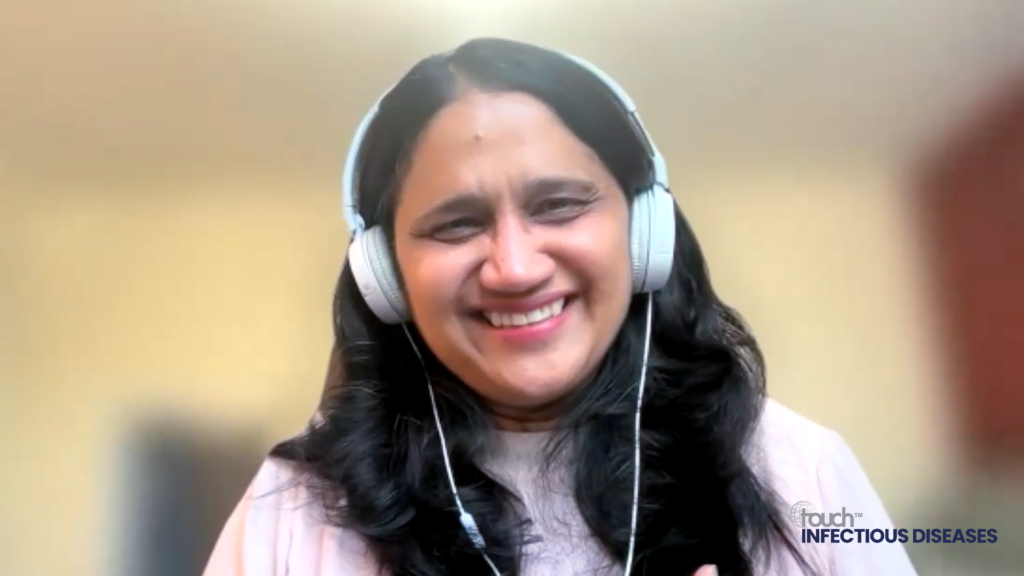The MONET phase 3 study investigated the safety and efficacy of several monoclonal antibodies (sotrovimab tixagevimab/cilgavimab, and nirmatrelvir–ritonavir) for the treatment of COVID-19 in non-hospitalised adult patients. We caught up with Dr. Valentina Mazzotta (IRCCS, Rome, Italy) to discuss the phase 4 post hoc analysis comparing SARS-CoV-2 viral load changes using sotrovimab tixagevimab/cilgavimab, and nirmatrelvir–ritonavir in non-hospitalized high-risk patients with early COVID-19 (EudraCT Number: 2021-004188-28).
The abstract ‘SARS-CoV-2 viral load change in a randomised trial on three different therapies for COVID-19.’ (Abstract number: O0429) was presented at ECCMID 2023, 15-18 April, 2023, Copenhagen, Denmark.
Questions:
- What is already known about the efficacy of monoclonal antibodies in treating SARS-CoV-2 Omicron sublineages? (0:22)
- What were the aims and design of your study? (0:49)
- What were the key findings? (2:14)
- How can viral load variation be used as a surrogate marker of efficacy when treating SARS-CoV-2 Omicron sublineages? (3:42)
- How will these findings optimise the use of nirmatrelvir–ritonavir in clinical practice? (5:04)
Disclosures: Valentina Mazzotta has nothing to disclose in relation to this video interview
Support: Interview and filming supported by Touch Medical Media Ltd. Interview conducted by Katey Gabrysch and Victoria Jones.
Filmed in coverage of the 33rd European Congress of Clinical Microbiology & Infectious Diseases.
Click here for more content on COVID-19 & for further ECCMID 2023 highlights visit here.
Transcript
What is already known about the efficacy of monoclonal antibodies in treating SARS-CoV-2 Omicron sublineages? (0:22)
Recent data, in in-vitro neutralization showed a reduction of the activity of some monoclonal antibodies against sub-lineages of omicron sars-cov-2. But the role or the impact of these in-vitro data on the in-vivo efficacy of the treatment are still unclear.
What were the aims and design of your study? (0:49)
Our study was a randomized trial, phase four, open label, with the aim to compare different treatments on early sars-cov-2 patients with mild to moderate COVID 19 and who are at high risk of progression, were randomized to receive either sotrovimab intravenous or tixagevimab/cilgavimab intramuscular or nirmatrelvir-ritonavir orally. They were evaluated at baseline and after seven days and after 29 days from randomization. At each visit they collected nasopharyngeal swabs for the measurement of viral load expressed at CT cycle threshold and the primary endpoint of the study was to compare clinical efficacy assessed as a composite end point, which included death, hospitalization for any cause or a progression to severe COVID 19. The secondary endpoint was to assess the variation in viral load in the nasopharyngeal swab from the randomization to day seven.
What were the key findings? (2:14)
Among the 400 patients that we analyzed for the primary endpoints, we would demonstrate a very low rate of clinical failure, that was 1.25%. We observed that no death and five hospitalizations, one in the sotrovimab arm, four in the tixagevimab/cilgavimab arm, and 0 in the nirmatrelvir-ritonavir arm. The comparison showed that in patients treated with the nirmatrelvir-ritonavir may have an advantage over those treated with the tixagevimab/cilgavimab. But this analysis is inconclusive for the superiority of this treatment because of the low number of events. Regarding the secondary endpoint of the viral load decrease from randomization to day seven, we observed that at the enrollment viral load was similar across the three arms, but at day seven we observed a stronger antiviral activity of nirmatrelvir-ritonavir in decreasing viral load.
How can viral load variation be used as a surrogate marker of efficacy when treating SARS-CoV-2 Omicron sublineages? (3:42)
The viral load variation was used in phase 2 clinical trial of monoclonal antibodies and actually in clinical practice is a common test to measure viral load in the nasopharyngeal swab. We know that the reproducibility of the viral load in nasopharyngeal swab is not so feasible as for example, in other kinds of test samples as blood with viremia. But in this omicron era, due to the lower probability to be hospitalized and the high percentage of persons vaccinated, probably clinical trials need other end-points different from the classical endpoint (such) as hospitalization and death when used in phase 3 clinical trials. So, we proposed this viral load measurement, viral load change as a surrogate marker of viral activity for assessment of the drug’s efficacy.
How will these findings optimise the use of nirmatrelvir–ritonavir in clinical practice? (5:04)
OK actually, nirmatrelvir-ritonavir are the drugs more used because for example, in Italy general practitioners can prescribe nirmatrelvir-ritonavir. So it’s widely used and guidelines are recommended. But there is some limitation, for example, in the population who can benefit of this drug. So researchers and clinicians need to investigate further for mechanism of action of harder drugs in order to tailor the treatment of COVID 19 for patients that can not benefit from the antiviral, you need a matter of their ritonavir.
Subtitles and transcript are autogenerated.










